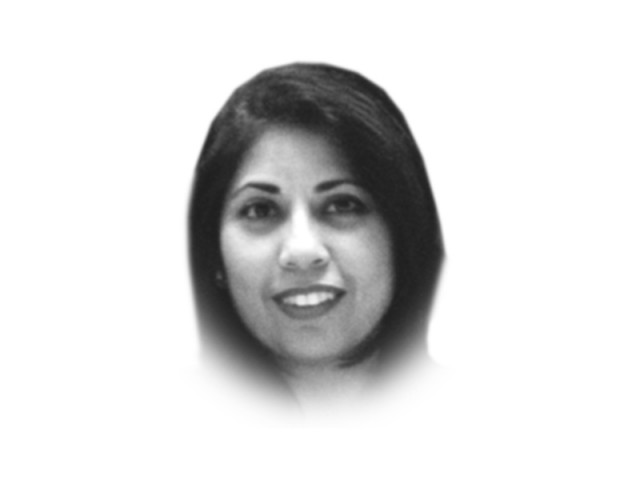The stuff that leaders are made of
It was obvious that Malala was born for greater things and destined to mark her footsteps in history.

The writer is a Toronto-based journalist with over 20 years of experience covering social and geopolitical issues. She is a former magazine editor of Dawn
But that was to be expected. A girl who started out at 12 years of age by taking up cudgels against one of the most ferocious criminals of the day — while living in their midst — is no ordinary girl. Dynamism is obviously part of her body make-up.

Subsequently, also for the past two weeks, a barrage of criticism has been directed at what has become the most talked of speech since US President Barack Obama’s Cairo address. The buzz on Malala’s address is continuing in the blogosphere, on Facebook, on Twitter and all virtual avenues, while the email circuit continues to circulate comments on it. But, that, too, was expected. What else can we hope for from inferiority-complex ridden politicians and closet Taliban who are fast becoming the majority in Pakistan?
Malala’s passionate delivery was somewhat overwhelming, though. Perhaps, because it did not fit with the image of a defenceless girl of delicate built, abused by the Taliban, whom it was easy to shower sympathy on. The girl standing at that global stage did not seem either defenseless or delicate. It was obvious that Malala was born for greater things and destined to mark her footsteps in history — something she has already done at 16.
A blogger on Huffington Post critiqued her as playing into the hands of the ‘white racists’ who are using her now as a tool to justify their foul actions in Afghanistan and against ‘Muslim barbarism’. Using many such comments that elucidated his opinion of how the West likes to use every opportunity to demonise the non-white Muslim man, he wrote, “...she is the perfect candidate for the white man to relieve his burden and save the native.”
The rhetoric of abusing the Westerners for all our drawbacks has become too irritating. It will never allow us to get out of the rot that Pakistan now finds itself in and we might as well pack up as a nation and let ourselves be run over by the mightier forces.
If we ourselves are going to downplay our own champions, then how can we blame the Western forces who will obviously jump on the chance to shelter our heroes and use them as a tool?
Rimsha Masih was recently given asylum in Canada on the basis of religious persecution in Pakistan — how can we expect them to see us as anything but savages? And when we do find amongst ourselves a natural born leader who can shame seasoned politicians through her courage, some of us have the audacity to condemn her actions?
The media today has almost supernatural powers as it can turn public opinion any way it wants, when it wants. If we want to expose the hypocrisy of the Western forces, we should criticise the West — not Malala, who is our saving grace. She will become a Western propaganda only if we negate the good she has done.
To accuse her father — as some bloggers in chat rooms have done — of having taken compensation to put Malala on the world stage is a sickening thought. How many of us would have the courage to allow our kids to face half the travails which that young teenager has faced and still allow them to continue the mission? Seriously, there should be rules of play governing the blogosphere as well.
Our best hope out of this national decay is to celebrate the good and encourage and put our faith in the younger generation where many Malalas may be found silently striving to create a healthier state of being. And if we don’t want the white man to own our heroes, we should know how to cherish them ourselves.
Published in The Express Tribune, July 25th, 2013.
Like Opinion & Editorial on Facebook, follow @ETOpEd on Twitter to receive all updates on all our daily pieces.












1724319076-0/Untitled-design-(5)1724319076-0-208x130.webp)


COMMENTS
Comments are moderated and generally will be posted if they are on-topic and not abusive.
For more information, please see our Comments FAQ